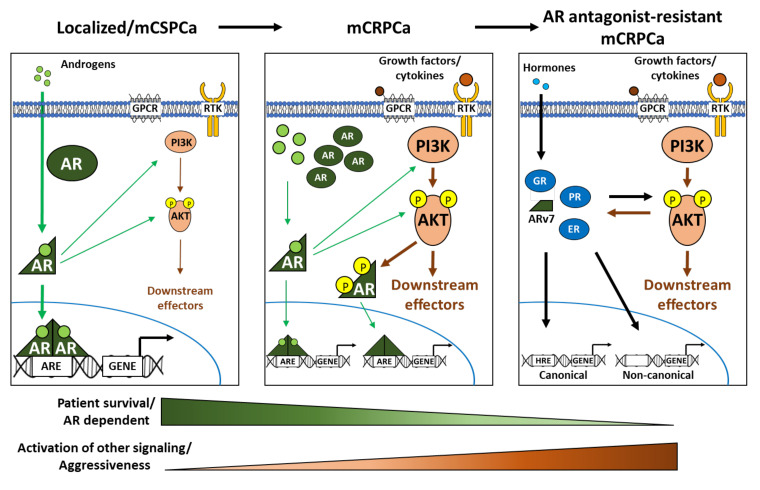Figure 2.
Transition from AR signaling-dependent to PI3K-AKT-mTOR pathway-dependent in PCa. PCa as a localized disease and at the early stage of metastatic disease is androgen- and castration-sensitive. The tumor at these stages strongly relies on systemic/circulating androgens for activating AR signaling to stimulate growth and progression (left panel). This makes it easy to suppress the tumor with therapeutic approaches that target androgen synthesis and AR signaling. However, after a certain period of time, the tumor will eventually develop a resistant stage called castration-resistance (middle panel). At this stage, ADT and the first generation of AR antagonists are not any more effective due to several hypothesized reasons, including intratumoral androgen synthesis, amplification of AR, activation of ligand-independent genomic AR signaling (e.g., via PI3K-AKT-mTOR), etc. These mechanisms suggest that the tumor at this stage still relies on AR signaling, although via adaptive responses, but could still be treated with second generation AR antagonists. Notably, bipolar androgen therapy (BAT) with cycling treatment of ADT and supraphysiological androgen levels seems to be also effective. Again, after a period of time, the tumor will become resistant to AR antagonist (right panel). Presumably, the therapeutic pressure by AR antagonists will selectively lead to the accumulation of PCa cells that no longer express AR or at least express mutated AR/AR splice variants (e.g., ARv7) lacking ligand binding domain. This makes the tumor insensitive to AR antagonists and BAT. Independent of AR, the tumor at this stage fully relies on hyperactivation of multiple cellular signaling cascades such as PI3K-AKT-mTOR and signaling of other nuclear hormone receptors (e.g., GR, PR, and ER). Along with more advance stages of the disease, an aggressiveness of the PCa is enhancing, whereas the survival of the PCa patient is reducing. AKT, protein kinase B; AR, androgen receptor; ARE, androgen response element; ARv7, androgen receptor splice variant 7; ER, estrogen receptor; GPCR, G-protein-coupled receptor; GR, glucocorticoid receptor; HRE, hormone response element; mCSPCa, metastatic castration-sensitive prostate cancer; mCRPCa, metastatic castration-resistant prostate cancer; P, phosphorylation; PI3K, phosphatidylinositol-3-kinase; PR, progesterone receptor; RTK, receptor tyrosine kinase.

